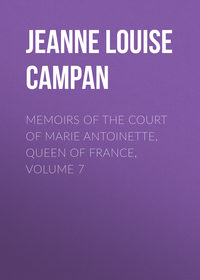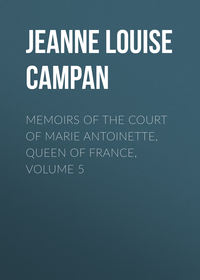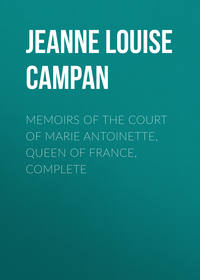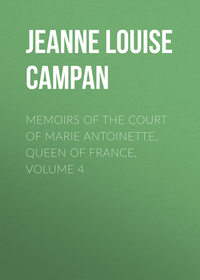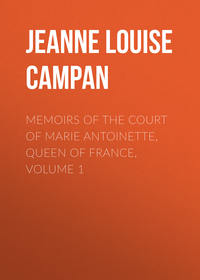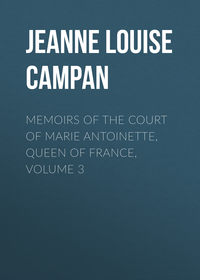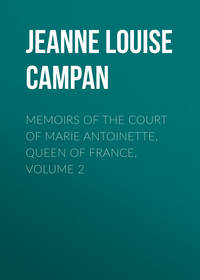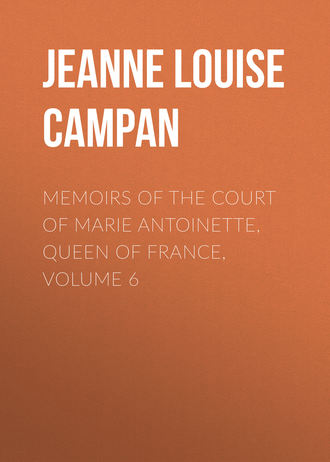 полная версия
полная версияMemoirs of the Court of Marie Antoinette, Queen of France, Volume 6
the sort of standards which they carried were symbols of the most atrocious barbarity. There was one representing a gibbet, to which a dirty doll was suspended; the words "Marie Antoinette a la lanterne" were written beneath it. Another was a board, to which a bullock's heart was fastened, with "Heart of Louis XVI." written round it. And a third showed the horn of an ox, with an obscene inscription.
One of the most furious Jacobin women who marched with these wretches stopped to give vent to a thousand imprecations against the Queen. Her Majesty asked whether she had ever seen her. She replied that she had not. Whether she had done her any, personal wrong? Her answer was the same; but she added:
"It is you who have caused the misery of the nation."
"You have been told so," answered the Queen; "you are deceived. As the wife of the King of France, and mother of the Dauphin, I am a French-woman; I shall never see my own country again, I can be happy or unhappy only in France; I was happy when you loved me."
The fury began to weep, asked her pardon, and said, "It was because I did not know you; I see that you are good."
Santerre, the monarch of the faubourgs, made his subjects file off as quickly as he could; and it was thought at the time that he was ignorant of the object of this insurrection, which was the murder of the royal family. However, it was eight o'clock in the evening before the palace was completely cleared. Twelve deputies, impelled by attachment to the King's person, ranged themselves near him at the commencement of the insurrection; but the deputation from the Assembly did not reach the Tuileries until six in the evening; all the doors of the apartments were broken. The Queen pointed out to the deputies the state of the King's palace, and the disgraceful manner in which his asylum had been violated under the very eyes of the Assembly; she saw that Merlin de Thionville was so much affected as to shed tears while she spoke.
"You weep, M. Merlin," said she to him, "at seeing the King and his family so cruelly treated by a people whom he always wished to make happy."
"True, Madame," replied Merlin; "I weep for the misfortunes of a beautiful and feeling woman, the mother of a family; but do not mistake, not one of my tears falls for either King or Queen; I hate kings and queens,—it is my religion."
The Queen could not appreciate this madness, and saw all that was to be apprehended by persons who evinced it.
All hope was gone, and nothing was thought of but succour from abroad. The Queen appealed to her family and the King's brothers; her letters probably became more pressing, and expressed apprehensions upon the tardiness of relief. Her Majesty read me one to herself from the Archduchess Christina, Gouvernante of the Low Countries: she reproached the Queen for some of her expressions, and told her that those out of France were at least as much alarmed as herself at the King's situation and her own; but that the manner of attempting to assist her might either save her or endanger her safety; and that the members of the coalition were bound to act prudently, entrusted as they were with interests so dear to them.
The 14th of July, 1792, fixed by the constitution as the anniversary of the independence of the nation drew near. The King and Queen were compelled to make their appearance on the occasion; aware that the plot of the 20th of June had their assassination for its object, they had no doubt but that their death was determined on for the day of this national festival. The Queen was recommended, in order to give the King's friends time to defend him if the attack should be made, to guard him against the first stroke of a dagger by making him wear a breastplate. I was directed to get one made in my apartments: it was composed of fifteen folds of Italian taffety, and formed into an under-waistcoat and a wide belt. This breastplate was tried; it resisted all thrusts of the dagger, and several balls were turned aside by it. When it was completed the difficulty was to let the King try it on without running the risk of being surprised. I wore the immense heavy waistcoat as an under-petticoat for three days without being able to find a favourable moment. At length the King found an opportunity one morning to pull off his coat in the Queen's chamber and try on the breastplate.
The Queen was in bed; the King pulled me gently by the gown, and drew me as far as he could from the Queen's bed, and said to me, in a very low tone of voice: "It is to satisfy her that I submit to this inconvenience: they will not assassinate me; their scheme is changed; they will put me to death another way." The Queen heard the King whispering to me, and when he was gone out she asked me what he had said. I hesitated to answer; she insisted that I should, saying that nothing must be concealed from her, and that she was resigned upon every point.
When she was informed of the King's remark she told me she had guessed it, that he had long since observed to her that all which was going forward in France was an imitation of the revolution in England in the time of Charles I., and that he was incessantly reading the history of that unfortunate monarch in order that he might act better than Charles had done at a similar crisis. "I begin to be fearful of the King's being brought to trial," continued the Queen; "as to me, I am a foreigner; they will assassinate me. What will become of my poor children?"
These sad ejaculations were followed by a torrent of tears. I wished to give her an antispasmodic; she refused it, saying that only happy women could feel nervous; that the cruel situation to which she was reduced rendered these remedies useless. In fact, the Queen, who during her happier days was frequently attacked by hysterical disorders, enjoyed more uniform health when all the faculties of her soul were called forth to support her physical strength.
I had prepared a corset for her, for the same purpose as the King's under-waistcoat, without her knowledge; but she would not make use of it; all my entreaties, all my tears, were in vain. "If the factions assassinate me," she replied, "it will be a fortunate event for me; they will deliver me from a most painful existence." A few days after the King had tried on his breastplate I met him on a back staircase. I drew back to let him pass. He stopped and took my hand; I wished to kiss his; he would not suffer it, but drew me towards him by the hand, and kissed both my cheeks without saying a single word.
The fear of another attack upon the Tuileries occasioned scrupulous search among the King's papers I burnt almost all those belonging to the Queen. She put her family letters, a great deal of correspondence which she thought it necessary to preserve for the history of the era of the Revolution, and particularly Barnave's letters and her answers, of which she had copies, into a portfolio, which she entrusted to M. de J–. That gentleman was unable to save this deposit, and it was burnt. The Queen left a few papers in her secretaire. Among them were instructions to Madame de Tourzel, respecting the dispositions of her children and the characters and abilities of the sub-governesses under that lady's orders. This paper, which the Queen drew up at the time of Madame de Tourzel's appointment, with several letters from Maria Theresa, filled with the best advice and instructions, was printed after the 10th of August by order of the Assembly in the collection of papers found in the secretaires of the King and Queen.
Her Majesty had still, without reckoning the income of the month, one hundred and forty thousand francs in gold. She was desirous of depositing the whole of it with me; but I advised her to retain fifteen hundred louis, as a sum of rather considerable amount might be suddenly necessary for her. The King had an immense quantity of papers, and unfortunately conceived the idea of privately making, with the assistance of a locksmith who had worked with him above ten years, a place of concealment in an inner corridor of his apartments. The place of concealment, but for the man's information, would have been long undiscovered? The wall in which it was made was painted to imitate large stones, and the opening was entirely concealed among the brown grooves which formed the shaded part of these painted stones. But even before this locksmith had denounced what was afterwards called the iron closet to the Assembly, the Queen was aware that he had talked of it to some of his friends; and that this man, in whom the King from long habit placed too much confidence, was a Jacobin. She warned the King of it, and prevailed on him to fill a very large portfolio with all the papers he was most interested in preserving, and entrust it to me. She entreated him in my presence to leave nothing in this closet; and the King, in order to quiet her, told her that he had left nothing there. I would have taken the portfolio and carried it to my apartment, but it was too heavy for me to lift. The King said he would carry it himself; I went before to open the doors for him. When he placed the portfolio in my inner closet he merely said, "The Queen will tell you what it contains." Upon my return to the Queen I put the question to her, deeming, from what the King had said, that it was necessary I should know. "They are," the Queen answered me, "such documents as would be most dangerous to the King should they go so far as to proceed to a trial against him. But what he wishes me to tell you is, that the portfolio contains a 'proces-verbal' of a cabinet council, in which the King gave his opinion against the war. He had it signed by all the ministers, and, in case of a trial, he trusts that this document will be very useful to him." I asked the Queen to whom she thought I ought to commit the portfolio. "To whom you please," answered she; "you alone are answerable for it. Do not quit the palace even during your vacation months: there may be circumstances under which it would be very desirable that we should be able to have it instantly."
At this period M. de La Fayette, who had probably given up the idea of establishing a republic in France similar to that of the United States, and was desirous to support the first constitution which he had sworn to defend, quitted his army and came to the Assembly for the purpose of supporting by his presence and by an energetic speech a petition signed by twenty thousand citizens against the late violation of the residence of the King and his family. The General found the constitutional party powerless, and saw that he himself had lost his popularity. The Assembly disapproved of the step he had taken; the King, for whom it, was taken, showed no satisfaction at it, and he saw himself compelled to return to his army as quickly as he could. He thought he could rely on the National Guard; but on the day of his arrival those officers who were in the King's interest inquired of his Majesty whether they were to forward the views of Gendral de La Fayette by joining him in such measures as he should pursue during his stay at Paris. The King enjoined them not to do so. From this answer M. de La Fayette perceived that he was abandoned by the remainder of his party in the Paris guard.
On his arrival a plan was presented to the Queen, in which it was proposed by a junction between La Fayette's army and the King's party to rescue the royal family and convey them to Rouen. I did not learn the particulars of this plan; the Queen only said to me upon the subject that M. de La Fayette was offered to them as a resource; but that it would be better for them to perish than to owe their safety to the man who had done them the most mischief, or to place themselves under the necessity of treating with him.
I passed the whole month of July without going to bed; I was fearful of some attack by night. There was one plot against the Queen's life which has never been made known. I was alone by her bedside at one o'clock in the morning; we heard somebody walking softly down the corridor, which passes along the whole line of her apartments, and which was then locked at each end. I went out to fetch the valet de chambre; he entered the corridor, and the Queen and myself soon heard the noise of two men fighting. The unfortunate Princess held me locked in her arms, and said to me, "What a situation! insults by day and assassins by night!" The valet de chambre cried out to her from the corridor, "Madame, it is a wretch that I know; I have him!"—"Let him go," said the Queen; "open the door to him; he came to murder me; the Jacobins would carry him about in triumph to-morrow." The man was a servant of the King's toilet, who had taken the key of the corridor out of his Majesty's pocket after he was in bed, no doubt with the intention of committing the crime suspected. The valet de chambre, who was a very strong man, held him by the wrists, and thrust him out at the door. The wretch did not speak a word. The valet de chambre said, in answer to the Queen, who spoke to him gratefully of the danger to which he had exposed himself, that he feared nothing, and that he had always a pair of excellent pistols about him for no other purpose than to defend her Majesty. The next day M. de Septeuil had all the locks of the King's inner apartments changed. I did the same by those of the Queen.
We were every moment told that the Faubourg St. Antoine was preparing to march against the palace. At four o'clock one morning towards the latter end of July a person came to give me information to that effect. I instantly sent off two men, on whom I could rely, with orders to proceed to the usual places for assembling, and to come back speedily and give me an account of the state of the city. We knew that at least an hour must elapse before the populace or the faubourgs assembled on the site of the Bastille could reach the Tuileries. It seemed to me sufficient for the Queen's safety that all about her should be awakened. I went softly into her room; she was asleep; I did not awaken her. I found General de W–in the great closet; he told me the meeting was, for this once, dispersing. The General had endeavoured to please the populace by the same means as M. de La Fayette had employed. He saluted the lowest poissarde, and lowered his hat down to his very stirrup. But the populace, who had been flattered for three years, required far different homage to its power, and the poor man was unnoticed. The King had been awakened, and so had Madame Elisabeth, who had gone to him. The Queen, yielding to the weight of her griefs, slept till nine o'clock on that day, which was very unusual with her. The King had already been to know whether she was awake; I told him what I had done, and the care I had taken not to disturb her. He thanked me, and said, "I was awake, and so was the whole palace; she ran no risk. I am very glad to see her take a little rest. Alas! her griefs double mine!" What was my chagrin when, upon awaking and learning what had passed, the Queen burst into tears from regret at not having been called, and began to upbraid me, on whose friendship she ought to have been able to rely, for having served her so ill under such circumstances! In vain did I reiterate that it had been only a false alarm, and that she required to have her strength recruited. "It is not diminished," said she; "misfortune gives us additional strength. Elisabeth was with the King, and I was asleep,—I who am determined to perish by his side! I am his wife; I will not suffer him to incur the smallest risk without my sharing it."
CHAPTER VIII
During July the correspondence of M. Bertrand de Molleville with the King and Queen was most active. M. de Marsilly, formerly a lieutenant of the Cent-Suisses of the Guard, was the bearer of the letters.
[I received by night only the King's answer, written with his own hand, in the margin of my letter. I always sent him back with the day's letter that to which he had replied the day before, so that my letters and his answers, of which I contented myself with taking notes only, never remained with me twenty-four hours. I proposed this arrangement to his Majesty to remove all uneasiness from his mind; my letters were generally delivered to the King or the Queen by M. de Marsilly, captain of the King's Guard, whose attachment and fidelity were known to their Majesties. I also sometimes employed M. Bernard de Marigny, who had left Brest for the purpose of sharing with his Majesty's faithful servants the dangers which threatened the King.—"Memoirs of Bertrand de Molleville," vol. ii., p. 12.]
He came to me the first time with a note from the Queen directed to M. Bertrand himself. In this note the Queen said: "Address yourself with full confidence to Madame Campan; the conduct of her brother in Russia has not at all influenced her sentiments; she is wholly devoted to us; and if, hereafter, you should have anything to say to us verbally, you may rely entirely upon her devotion and discretion."
The mobs which gathered almost nightly in the faubourgs alarmed the Queen's friends; they entreated her not to sleep in her room on the ground floor of the Tuileries. She removed to the first floor, to a room which was between the King's apartments and those of the Dauphin. Being awake always from daybreak, she ordered that neither the shutters nor the window-blinds should be closed, that her long sleepless nights might be the less weary. About the middle of one of these nights, when the moon was shining into her bedchamber, she gazed at it, and told me that in a month she should not see that moon unless freed from her chains, and beholding the King at liberty. She then imparted to me all that was concurring to deliver them; but said that the opinions of their intimate advisers were alarmingly at variance; that some vouched for complete success, while others pointed out insurmountable dangers. She added that she possessed the itinerary of the march of the Princes and the King of Prussia: that on such a day they would be at Verdun, on another day at such a place, that Lille was about to be besieged, but that M. de J–, whose prudence and intelligence the King, as well as herself, highly valued, alarmed them much respecting the success of that siege, and made them apprehensive that, even were the commandant devoted to them, the civil authority, which by the constitution gave great power to the mayors of towns, would overrule the military commandant. She was also very uneasy as to what would take place at Paris during the interval, and spoke to me of the King's want of energy, but always in terms expressive of her veneration for his virtues and her attachment to himself.—"The King," said she, "is not a coward; he possesses abundance of passive courage, but he is overwhelmed by an awkward shyness, a mistrust of himself, which proceeds from his education as much as from his disposition. He is afraid to command, and, above all things, dreads speaking to assembled numbers. He lived like a child, and always ill at ease under the eyes of Louis XV., until the age of twenty-one. This constraint confirmed his timidity.
"Circumstanced as we are, a few well-delivered words addressed to the Parisians, who are devoted to him, would multiply the strength of our party a hundredfold: he will not utter them. What can we expect from those addresses to the people which he has been advised to post up? Nothing but fresh outrages. As for myself, I could do anything, and would appear on horseback if necessary. But if I were really to begin to act, that would be furnishing arms to the King's enemies; the cry against the Austrian, and against the sway of a woman, would become general in France; and, moreover, by showing myself, I should render the King a mere nothing. A queen who is not regent ought, under these circumstances, to remain passive and prepare to die."
The garden of the Tuileries was full of maddened men, who insulted all who seemed to side with the Court. "The Life of Marie Antoinette" was cried under the Queen's windows, infamous plates were annexed to the book, the hawkers showed them to the passersby. On all sides were heard the jubilant outcries of a people in a state of delirium almost as frightful as the explosion of their rage. The Queen and her children were unable to breathe the open air any longer. It was determined that the garden of the Tuileries should be closed: as soon as this step was taken the Assembly decreed that the whole length of the Terrace des Feuillans belonged to it, and fixed the boundary between what was called the national ground and the Coblentz ground by a tricoloured ribbon stretched from one end of the terrace to the other. All good citizens were ordered, by notices affixed to it, not to go down into the garden, under pain of being treated in the same manner as Foulon and Berthier. A young man who did not observe this written order went down into the garden; furious outcries, threats of la lanterne, and the crowd of people which collected upon the terrace warned him of his imprudence, and the danger which he ran. He immediately pulled off his shoes, took out his handkerchief, and wiped the dust from their soles. The people cried out, "Bravo! the good citizen for ever!" He was carried off in triumph. The shutting up of the Tuileries did not enable the Queen and her children to walk in the garden. The people on the terrace sent forth dreadful shouts, and she was twice compelled to return to her apartments.
In the early part of August many zealous persons offered the King money; he refused considerable sums, being unwilling to injure the fortunes of individuals. M. de la Ferte, intendant of the 'menus plaisirs', brought me a thousand louis, requesting me to lay them at the feet of the Queen. He thought she could not have too much money at so perilous a time, and that every good Frenchman should hasten to place all his ready money in her hands. She refused this sum, and others of much greater amount which were offered to her.
[M. Auguie, my brother-in-law, receiver-general of the finances, offered her, through his wife, a portfolio containing one hundred thousand crowns in paper money. On this occasion the Queen said the most affecting things to my sister, expressive of her happiness at having contributed to the fortunes of such faithful subjects as herself and her husband, but declined her offer.—MADAME CAMPAN.]
However, a few days afterwards, she told me she would accept M. de la Ferte's twenty-four thousand francs, because they would make up a sum which the King had to expend. She therefore directed, me to go and receive those twenty-four thousand francs, to add them to the one hundred thousand francs she had placed in my hands, and to change the whole into assignats to increase their amount. Her orders were executed, and the assignats were delivered to the King. The Queen informed me that Madame Elisabeth had found a well-meaning man who had engaged to gain over Petion by the bribe of a large sum of money, and that deputy would, by a preconcerted signal, inform the King of the success of the project. His Majesty soon had an opportunity of seeing Petion, and on the Queen asking him before me if he was satisfied with him, the King replied, "Neither more nor less satisfied than usual; he did not make the concerted signal, and I believe I have been cheated." The Queen then condescended to explain the whole of the enigma to me. "Petion," said she, "was, while talking to the King, to have kept his finger fixed upon his right eye for at least two seconds."—"He did not even put his hand up to his chin," said the King; "after all, it is but so much money stolen: the thief will not boast of it, and the affair will remain a secret. Let us talk of something else." He turned to me and said, "Your father was an intimate friend of Mandat, who now commands the National Guard; describe him to me; what ought I to expect from him?" I answered that he was one of his Majesty's most faithful subjects, but that with a great deal of loyalty he possessed very little sense, and that he was involved in the constitutional vortex. "I understand," said the King; "he is a man who would defend my palace and my person, because that is enjoined by the constitution which he has sworn to support, but who would fight against the party in favour of sovereign authority; it is well to know this with certainty."
On the next day the Princesse de Lamballe sent for me very early in the morning. I found her on a sofa facing a window that looked upon the Pont Royal. She then occupied that apartment of the Pavilion of Flora which was on a level with that of the Queen. She desired me to sit down by her. Her Highness had a writing-desk upon her knees. "You have had many enemies," said she; "attempts have been made to deprive you of the Queen's favour; they have been far from successful. Do you know that even I myself, not being so well acquainted with you as the Queen, was rendered suspicious of you; and that upon the arrival of the Court at the Tuileries I gave you a companion to be a spy upon you; and that I had another belonging to the police placed at your door! I was assured that you received five or six of the most virulent deputies of the Tiers Etat; but it was that wardrobe woman whose rooms were above you.


